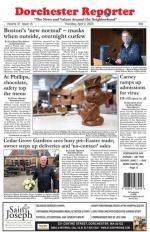April 23, 2009
Lew Finfer did not mince words. Hours after House leaders released their version of the fiscal 2010 budget last week, he blasted out to his network an e-mail titled, “Public Safety and Youth Programs DEMOLISHED by House Ways and Means budget proposal.â€
The e-mail from Finfer, executive director of the Massachusetts Communities Action Network, was typical of others from similar advocates and groups that pored over a $27.5 billion budget. The document cuts state aid to cities and towns by 25 percent and rips $532 out million of Patrick’s version of the budget. The budget does not include any increases in taxes or a withdrawal from the state’s so-called $1.4 billion “rainy day fund.â€
Under the proposed House budget, slated for debate next week, Dorchester would lose several hundred teen jobs and hundreds of thousands of dollars in programming in service, according to Finfer.
In particular, a $13 million anti-violence program, known as the Shannon Grant, popular with local legislators, is completely eliminated. Community policing programs, totaling $25 million, were also cut, on top of a $3.5 million Department of Public Health youth violence prevention program.
The e-mails and outcry from advocates share another similarity: the call for new revenues to restore the programs, through an increase in a variety of taxes, including an alcohol tax, the state income tax and the sales tax.
“No one is getting a chance of restoration without a revenue package,†Finfer said.
Over 60 revenue-raising amendments have been filed to the budget, which lawmakers start debating this Monday.
“On that day, I hope there will be a very lively debate where they come up with a balanced package,†said Judy Meredith, a human services advocate from Dorchester. “I don’t know if we’re going to restore them all. But we’re not going to restore any of them without new revenue.â€
The Senate will be up next, with its version of the budget, before the two branches send an agreed-upon budget to the governor in July.
Pushing for restoration of cuts to the Dorchester Youth Collaborative, the Tuttle House, the Joe Timilty Adult Day Health Center and other local programs, state Rep. Marty Walsh said he is willing to support increasing the sales tax to 6 percent, a tax on alcohol that would bring in $800 million, and an increase of the state income tax to 5.5 percent from 5.3 percent.
House Republicans argue state government should not burden taxpayers during a recession with additional taxes. And the same day the House released its budget, hundreds of protestors rallied on Boston Common calling for smaller government and no tax increases.
The left-leaning Massachusetts Budget and Policy Center criticized the budget cuts as too deep.
“While the state faces very serious fiscal challenges, the cuts recommended in the House Ways and Means budget are deeper than they would need to be if the state were to use all of the federal stimulus money to maintain services – as Congress intended,†the center’s preliminary analysis said, referring to the billions in funds the federal government is sending to states.
Walsh, a Democrat, and others argue that Dorchester, where parts of the community are already reeling from fiscal crisis through credit card debt and housing, was “disproportionately hit†by the cuts.
“These are communities that are already barely getting by,†said Camille Watson, health disparities policies coordinator for Health Care For All, a consumer advocacy group. “This is the time when people need those social supports more than ever.â€
The group supports the taxes on alcohol and sugary snacks, as Patrick has proposed, along with an additional tobacco products tax.
Rep. Charley Murphy, a Burlington Democrat who was appointed this year to chair the budget-writing House Ways and Means Committee, said no single community was singled out.
“I didn’t go through it by neighborhood,†he told the Reporter. “â€We cut what we had to cut. Some communities were hurt more than others.â€
As for raising revenues, Murphy said House lawmakers were “open to debate.â€
Advocates of raising revenues hope to push legislators over to their side with a number of rallies over the next few days.
One Massachusetts, an umbrella group of progressive groups pushing for new revenues, is holding a “virtual rally†and calling on supporters to contact their respective lawmakers and get others involved through social networking sites such as Twitter and Facebook.
For some, the budget wasn’t all doom and gloom. In an e-mail to fellow members of BPS Parents, a volunteer group, Karina Meiri touted “good news†in the House level-funding education aid at $3.95 billion with the assumption of expected federal aid. Meiri, a Tufts University professor, urged members to thank their representatives through e-mail.
Material from State House News Service was used in this report.



